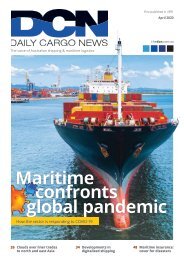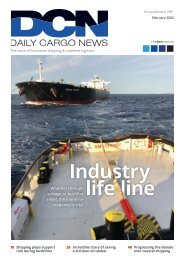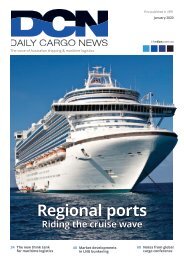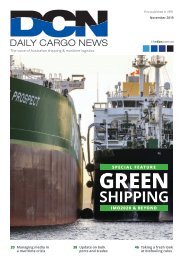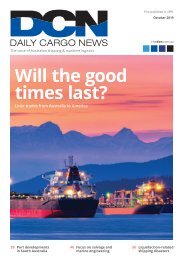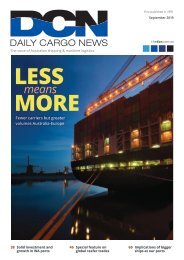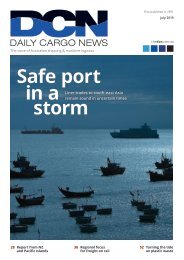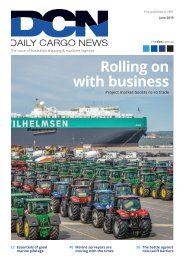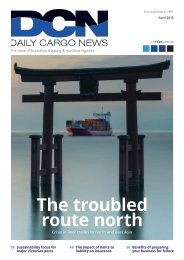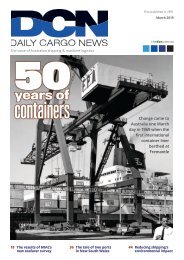DCN May Edition 2019
Create successful ePaper yourself
Turn your PDF publications into a flip-book with our unique Google optimized e-Paper software.
INDUSTRY OPINION<br />
Measures to control the brown<br />
marmorated stink bug<br />
A series of enhanced anti-stink bug measures are set to provide added challenges<br />
to industry, writes Andrew Crawford<br />
AS MANY READERS KNOW, THE<br />
response to the brown marmorated stink<br />
bug 2018-<strong>2019</strong> season by the Department<br />
of Agriculture and Water Resources<br />
exposed deficiencies in processes. Since the<br />
implementation of the BMSB emergency<br />
measures, FTA members witnessed a<br />
deterioration of service levels across the<br />
department, with key import services such<br />
as bookings and inspections most affected.<br />
A DEFICIENCY SUBMISSION<br />
Based on member feedback, FTA<br />
provided a submission to identify those<br />
deficiencies and provide a clear list of<br />
recommendations and considerations<br />
for the inspector-general of biosecurity.<br />
While many recommendations related<br />
to the department’s staffing levels,<br />
others sought to optimise and expand on<br />
existing initiatives, such as the Approved<br />
Arrangement scheme, the 19.2. Automatic<br />
Entry Processing for Commodities, Cargo<br />
Online Lodgement System and the Highly<br />
Compliant Importer Project. Strong, fair<br />
and consistent compliance is essential to<br />
underpin these systems and arrangements<br />
to allow industry an increased<br />
responsibility to manage biosecurity risks.<br />
STRONG COMPLIANCE RECORD<br />
FTA also advocated that increased<br />
responsibility should be given to those that<br />
have a strong compliance record. We now<br />
know that the upcoming <strong>2019</strong>-2020 season<br />
will be expanded to include more target risk<br />
countries. The list of countries includes the<br />
same as 2018/19, however another 23 have<br />
been added. The entire list is as follows:<br />
United States of America, Czech<br />
Republic, France, Canada, Georgia, Russia,<br />
Albania, Germany, Serbia, Andorra,<br />
Greece, Slovakia, Armenia, Hungary,<br />
Slovenia, Austria, Italy, Switzerland,<br />
Azerbaijan, Kosovo, Luxembourg,<br />
Belgium, Liechtenstein, Romania, Bosnia<br />
Andrew Crawford, head of border and<br />
biosecurity, Freight & Trade Alliance<br />
and Herzegovina, Macedonia, Spain,<br />
Bulgaria, Montenegro, Turkey, Croatia,<br />
The Netherlands, Japan (heightened vessel<br />
surveillance will be the measure applied).<br />
UPDATE ON BIOSECURITY LEVY<br />
It now has been confirmed that the start date of the<br />
contentious biosecurity levy has been delayed. In the recent<br />
Federal budget, it was announced that the implementation<br />
date of the biosecurity levy announced in last year’s budget has been changed<br />
from 1 July <strong>2019</strong> to 1 September <strong>2019</strong>. This delay is to allow the Industry Steering<br />
Committee (of which Paul Zalai, one of FTA’s directors, is a member) the opportunity<br />
to make recommendations to the minister. The quantum and method of collection<br />
of the biosecurity levy could well be impacted by a change of government.<br />
BACKGROUND<br />
The Biosecurity Import Levy was announced in the 2018 Federal Budget with the<br />
aim to collect $325m over three years from a start date of 1 July <strong>2019</strong>. Since that<br />
time there has been significant controversy surrounding the implementation of<br />
the levy, ultimately leading to the Department of Agriculture and Water Resources<br />
commissioning an independent review by Pegasus Economics. Its report was<br />
publicly released on Friday 29 March <strong>2019</strong>.<br />
FTA was privileged to be appointed by the minister to participate with eight other<br />
industry representatives in the committee led by an independent chair (David<br />
Trebeck) and supported by Pegasus Economics.<br />
FTA will continue to be heavily involved in discussions and planning and will<br />
provide readers with further updates as they emerge.<br />
MANDATORY OFFSHORE TREATMENT<br />
The other significant difference for next<br />
season could be the introduction of<br />
mandatory offshore treatment of target<br />
high risk goods shipped in sealed six-sided<br />
containers, as LCL (less than container<br />
load) and FAK (freight of all kinds). This<br />
was the department’s preferred position<br />
for 2018/19 and FTA and others advocated<br />
against this due to several commercial<br />
considerations. FTA will continue to work<br />
with the department on this.<br />
SAFEGUARDING ARRANGEMENTS<br />
The department is developing policies to<br />
allow for certain goods and supply chains<br />
to be recognised under safeguarding<br />
arrangements for the <strong>2019</strong>–20 season. A<br />
trial by invitation will be conducted of the<br />
arrangements. We expect more detailed<br />
information in the next few months.<br />
Ruth Swan; FTA<br />
16 <strong>May</strong> <strong>2019</strong><br />
thedcn.com.au



